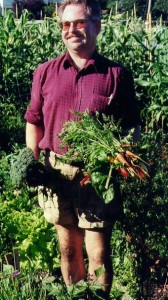Seattleites love eating locally — more and more of us are becoming “Locovores“. At the most recent History Cafe — a monthly meetup sponsored by KCTS-9, MOHAI and the Seattle Public Library — we were regaled by tales of urban agriculture past and present by historian Fred Brown and P-Patch Trust board member Joyce Moty. Fred concentrated on the history of keeping farm animals in Seattle (legal until the postwar years, then creeping back more recently), while Joyce gave the plant’s eye view of growing food in the City. While perhaps a bit light on the history, the presentation had entertaining sidelights on chicken raising and the demographics of animal husbandry within the city limits.
As an enthusiastic P-Patcher myself, I threw out a few comments when appropriate. Like the fact that my garden has contributed around two tons a year of fresh, organic food to the hard-pressed Food Bank network in Seattle in each of the last several years, thanks to the free pick-up and delivery organized by the Lettuce Link program. (Overall contributions for the system are much higher although the exact statistic eludes me.) Another point was the fact that P-Patch has pioneered Art in the Garden — and the fact that the P-Patch program is considered a national model for community gardening. We in Seattle are fortunate to have so many organizations devoted to organic growing: the P-Patch, the Ti
lth, 21 Acres — even City Hall since Mike McGinn took over as Mayor. Some news and lively pictures about Seattle gardening can be seen in the Winter 2011 issue of the P-Patch Post. An important aspect of community gardening is
the way it builds community: shared labors, harvest, and gardening tips all lead to a more cohesive and loving community here in the Rainy City.
Planting in the grass strips along residential streets has been approved, overturning a previous ruling by the Sanitation Dept. Plans are afoot for creating growing spaces in the cable paths around the city, increasing our ability to feed ourselves without importing food from California — or Chile. Fewer 6-mpg trailers from Barstow — less diesel air pollution — slower global warming, yet fresher food. What a concept!
History Cafe takes place the third Thursday of the month at Roy Street Coffee on Capitol Hill.
This venue is a pleasant, neighborhood spot with a rustic living-room ambience, a new spot for History Cafe. A new project of Starbucks, it aims to capture a less commercial customer base, aiming to han
g out in comfy surroundings. The coffee is excellent and priced a bit below normal, although on the night I visited, the “condiments bar” offerings were limited to salt, pepper, sugar, and honey: I like cinnamon and nutmeg in mine. The nonfat milk was also empty, although a quick alert to the friendly staff soon remedied that. Roy Street Coffee also serves finger-food, plus wine and beer in the evenings.
If you’re a history buff, stop by to the Cafe next month. One of these months you might hear me holding forth on my best-loved historic topic: the history of the battleship, as evidenced in my site, Big, Bad Battleships (dot) Com. Full information on the History Cafe can be accessed through Meetup. Info on setting up your own vegetable garden can be found here.
